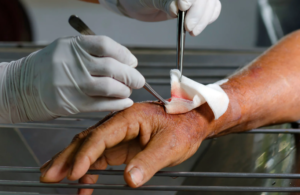Understanding Knee Replacement Surgery
Knee replacement surgery is a medical procedure designed to restore mobility and reduce pain in patients suffering from severe joint problems. It typically involves replacing damaged parts of the knee joint with artificial implants that function like a natural knee. There are two main types: partial knee replacement, which targets only the damaged section of the knee, and total knee replacement, which involves replacing the entire joint. These procedures have become more common as people live longer, and conditions such as arthritis, injuries, or degenerative diseases take a toll on joint health. Thanks to advances in technology, the surgery has become safer and more efficient, with shorter hospital stays and quicker recovery times. For many patients, this operation restores not just physical movement but also confidence and independence. Understanding the process helps patients see why affordability matters without sacrificing quality outcomes.
The Rising Demand for Knee Replacement Procedures
The demand for knee replacement surgeries has surged in recent years, largely due to the increasing prevalence of osteoarthritis. As populations age, joint-related conditions become more common, creating a higher need for effective medical solutions. Younger individuals are also seeking surgery after sports injuries, accidents, or excessive strain on joints caused by physically demanding jobs. Lifestyle changes, including sedentary habits and weight gain, contribute to knee damage, which accelerates the need for surgery. This rise in demand has also led to higher costs in many healthcare settings, putting financial strain on patients. As a result, affordable knee replacement options have become a major priority for individuals and families worldwide. Patients want relief from chronic pain but also need assurance that treatment won’t cause long-term financial hardship. The growing interest in cost-effective solutions is driving innovations in care delivery.
Cost Factors That Affect Knee Replacement Surgery
The cost of knee replacement surgery can vary widely depending on several factors. Hospital and facility fees typically make up a significant portion of the expenses, with private hospitals often charging more than public ones. Surgeon expertise also plays a role, as highly experienced orthopedic specialists may charge higher professional fees. The type of implants used is another factor, since premium or imported implants usually cost more than locally manufactured ones. Additional costs include pre-surgery consultations, blood tests, imaging scans, and post-surgery rehabilitation services. The geographic location of treatment can also influence pricing, with urban hospitals often more expensive than regional or provincial ones. Even the type of procedure — whether minimally invasive or traditional — affects the overall bill. Understanding these cost factors helps patients make informed choices when comparing affordable knee replacement options.
Exploring Affordable Knee Replacement Options
There are several pathways for patients seeking affordable knee replacement without compromising safety. Public hospitals often provide lower-cost services compared to private facilities, though waiting times may be longer. Specialty orthopedic centers may offer package rates that include surgery, hospital stay, and rehabilitation, making expenses more predictable. Another growing trend is medical tourism, where patients travel to countries with lower healthcare costs while still receiving quality care from accredited hospitals. For example, some destinations in Asia and Eastern Europe have gained strong reputations for affordable orthopedic surgeries. Patients can also compare the costs between traditional open procedures and minimally invasive techniques, which may reduce hospital stays and overall expenses. Many local providers are now offering competitive packages to attract patients who might otherwise travel abroad. Evaluating all available options ensures that patients balance affordability with quality outcomes.
Insurance Coverage and Financing Options
Insurance plays a critical role in making knee replacement surgery more affordable. Many health insurance plans cover a portion of the cost, though coverage details can vary widely between providers. Some plans may cover the surgery itself but leave patients responsible for implant upgrades, hospital stays, or rehabilitation. For those without adequate insurance, financing plans are often available to spread payments over time, reducing the immediate financial burden. Patients can also explore employer-based health benefits or government subsidies that may cover part of the treatment cost. Negotiating with hospitals or clinics is another strategy, as some institutions provide discounts for self-paying patients. By carefully reviewing insurance policies and available financing options, patients can significantly reduce out-of-pocket expenses. Affordable knee replacement becomes more achievable when financial planning is part of the process.
The Role of Quality in Affordable Knee Replacement
While cost is a critical factor, patients should never overlook quality when choosing a knee replacement provider. The cheapest option may appear attractive but could lead to complications, additional expenses, or even failed surgeries. To ensure safety, patients should check the accreditation of hospitals and the qualifications of surgeons. Experienced orthopedic specialists tend to deliver better outcomes and reduce the risk of revision surgeries, which are more costly than the initial procedure. Implant durability is another important consideration since long-lasting implants provide better value over time. Patients can ask about success rates, infection control practices, and rehabilitation support when comparing providers. Balancing affordability with high standards of care ensures not only financial relief but also long-term health benefits. Making informed choices protects patients from unnecessary risks.
Preparing for a Cost-Effective Knee Replacement
Preparation plays a vital role in ensuring a smooth and affordable knee replacement journey. Patients can start by making lifestyle changes such as losing weight, eating a balanced diet, and strengthening leg muscles before surgery. These steps help improve surgical outcomes and reduce complications, which may lower costs. Pre-surgery planning also involves undergoing necessary tests and consultations in advance to avoid last-minute expenses. Selecting a reliable hospital or clinic with transparent pricing can prevent hidden fees. Patients should also research rehabilitation programs, including home-based options, to save on recovery costs. Additionally, organizing transportation and post-surgery support ahead of time minimizes unexpected spending. Proper preparation not only reduces financial stress but also improves overall results, making affordable knee replacement a more successful experience.
Post-Surgery Care on a Budget
Recovery after knee replacement surgery is essential to achieving long-term success. Affordable rehabilitation options include community health programs, group therapy sessions, and guided home exercises. Patients can also utilize online platforms that offer exercise tutorials and recovery tips at little to no cost. Choosing generic medications instead of branded ones helps reduce expenses for pain management. Simple lifestyle habits such as maintaining a healthy weight, avoiding excessive strain, and using mobility aids correctly can extend the life of the implant. Scheduling follow-up visits strategically, such as combining checkups with other necessary appointments, saves on travel and consultation fees. Patients may also benefit from support groups that share resources for cost-effective recovery. With smart budgeting and proactive care, patients can maintain knee health without unnecessary spending.
Frequently Asked Questions About Affordable Knee Replacement
What is the average cost of knee replacement surgery?
The cost can range widely depending on country, hospital, and type of procedure. On average, patients can expect to spend several thousand dollars, though affordable knee replacement options exist both locally and internationally.
Can I get a quality knee replacement at a lower cost?
Yes. Many accredited hospitals and experienced surgeons offer budget-friendly packages without compromising safety or outcomes. The key is to balance affordability with quality standards.
Does insurance always cover knee replacement surgery?
Not always. Some policies cover the procedure itself but may not include implants, rehabilitation, or post-surgery care. Reviewing policy details is essential before scheduling surgery.
Is it safe to travel abroad for a more affordable knee replacement?
Medical tourism can be safe if patients carefully choose accredited hospitals and qualified surgeons. Researching reviews, certifications, and patient outcomes is essential before making this decision.
How can I prepare financially for the procedure?
Patients should explore insurance coverage, financing plans, and hospital discounts. Saving in advance, negotiating costs, and preparing for rehabilitation expenses also make the process more affordable.






